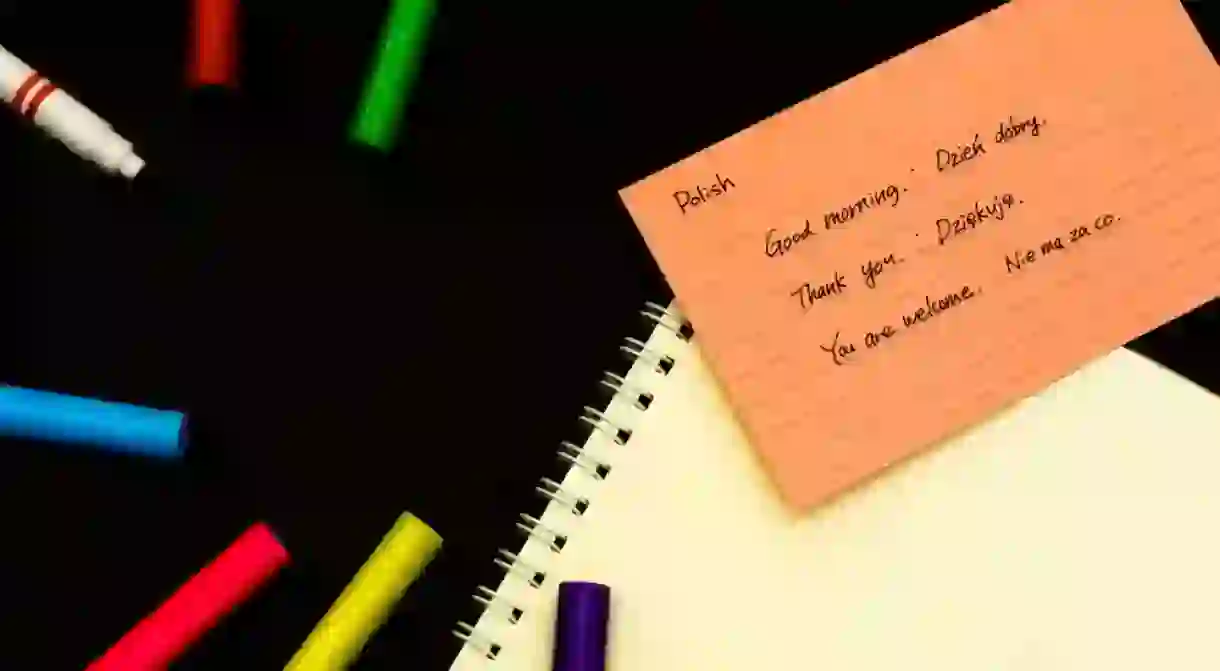12 Essential Polish Phrases You Need to Know

Polish has a rep as one of the hardest languages on the planet to learn. To help you navigate the soft hisses and endless sibilant sounds of the Slavic tongue, we’ve put together a list of 12 top phrases that will help you on that holiday to Poland.
Brushing up on your Polish ahead of a visit? Enlist the help of a local guide on your travels by booking one of these trips, tours and experiences in Poland.
‘Na Zdrowie!’ (nas-dro-v-yea)
Meaning: Cheers!
Starting strong, this terse little snippet is the Polish ‘cheers!’ It’s to be used whenever you raise a shot of that potent local bison grass vodka (which, with any luck, should be quite often!) It can also be heard following sneezes (like ‘bless you’) and as an exclamation towards good health.
‘Dzień dobry’ (jine-dobree)
Meaning: Good day
Saying hello is one of the fundamentals of getting to grips with any local lingo. That’s why ‘dzień dobry’ occupies a place close to the top here. While it literally means ‘good morning’, the phrase can be used in the early hours and late at night, and is a formal, polite greeting that should get you through.
‘Proszę’ (proshe)
Meaning: Please
Minding your Ps and Qs in Poland means having your pleases and thank you’s down to a T. Here’s the first you’ll need. Tack it on the end of any order for local Cracovian pretzels, steaming bigos stew or frothy Slavic beers and it might just bring a smile from the server!
‘Dziękuję’ (jen-koo-yea)
Meaning: Thank you
The second of the necessary pleasantries comes in the form of ‘dziękuję’. This is the Polish thank you – you know, to be used after you’ve received your crispy pretzel, your steaming bigos stew or your frothy Slavic beer!
‘Nie rozumiem’ (nie ro-zoo-me-em)
Meaning: I don’t understand
It’s worth keeping this one handy for when the locals start chatting away with their trademark sibilant sentences. You’re not likely to understand a thing (Polish is an uber-hard language for English natives) but a classic ‘I don’t understand’ may just save you from the linguistic quagmire.
‘Jak masz na imię?’ (yak-mash-na-im-yea)
Meaning: What’s your name?
Okay, so while you might not be able to pronounce the name once you’ve got it (Polish monikers are famed for their tongue-twisting nature), it’s still a nice gesture to at least ask. And remember, nicknames are common in these parts, from Basias to Kubas, Asias to Olas – get to know them too!
‘Przepraszam’ (psh-she-pra-sham)
Meaning: Sorry
Often demonised by learners of Polish as one of the most unpronounceable phrases in the entire lexicon, this dribble -inducing number can be used to both apologise and ask folk to move out of the way.
‘Jak się masz?’ (yak-she-or-mash)
Meaning: How are you?
Made famous by one Borat, this well-known little phrase is the go-to ask to kick-off a conversation with a Polish local. Once you know who it is you’re talking too, feel free to drop into more casual ways of questioning – a simple siema (what’s up) will do the next time you meet.
‘Kocham cię’ (Ko-ham-chi-yea)
Meaning: I love you
Now we’re not saying it’s likely you’ll be using this one (at least, that is, if Polish Tinder doesn’t get its claws into you from the get go), but it’s certainly a handy phrase to have in the arsenal, don’t you think? Romance in Krakow perhaps?
‘Czy mówisz po angielsku?’ (ch-mo-vish-po-ang-ee-el-skew)
Meaning: Do you speak English?
Now we know just how bad it is to break that immersion if you’re really trying to learn the Polish language, but there’s always going to be a moment when it feels like your swimming against a tide of sibilants and just need a hit of your native tongue. Cue this useful snippet.
‘Ile to kosztuje?’ (ee-le-toe-kosh-too-yea)
Meaning: How much does this cost?
Keep this one handy for all those days spend shopping through the old Cloth Hall of Krakow, in the weekly flea markets of the city’s Kazimierz district, or in Warsaw’s chichi boutiques and modern malls.
‘Wszystkiego najlepszego!’ (wsh-ust-key-a-go-ni-lep-shea-go)
Meaning: Happy birthday!
A fun one to round off this list of the handiest Polish phrases: Happy birthday. It’s not the easiest to say, but just you wait until the sto lat’s and curious regional birthday songs strike up to accompany it!













